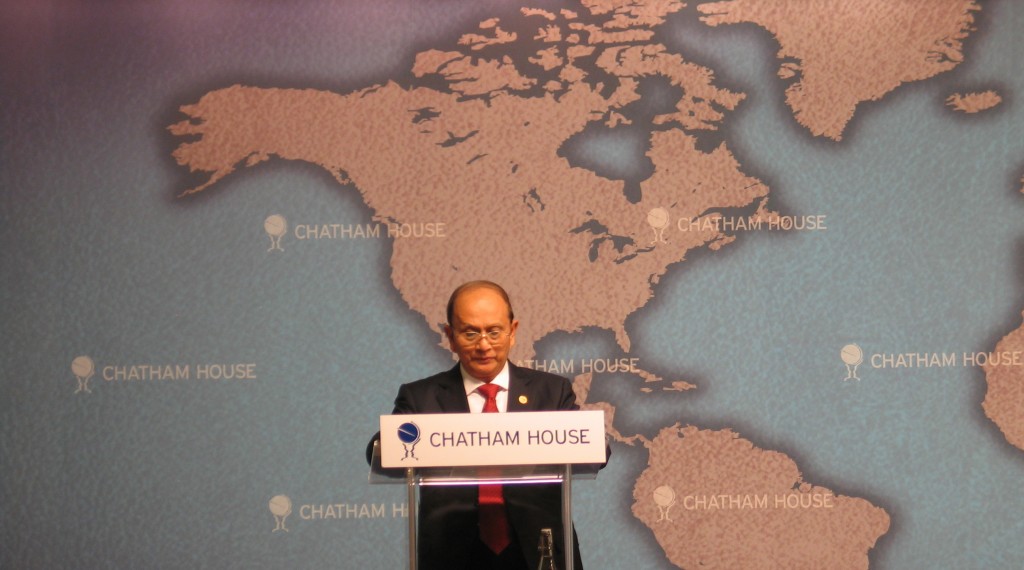Thein Sein made the only public address of his trip to Britain when he gave a speech to members of the Royal Institute of International Affairs at Chatham House in London on Monday, 15 July 2013.
He outlined the problems facing Burma on the road to modernization and how he intended to tackle them and help normal Burmese people.
He talked about things his government had already done to help transform the country.
These included bringing in a new constitution, holding elections, lifting media and internet censorship and new laws to protect freedom of association and expression.
His promise to free all political prisoners was a tacit admission that his previous claims to have already released all political prisoners were untrue
He said: “A special committee, comprised in part of former prisoners, is working diligently to ensure that no one remains in prison for his or her political beliefs or actions. We are reviewing all cases. I guarantee you that by the end of this year there will be no prisoners of conscience in Myanmar.”
He said Burma had changed its currency regime and changed investment laws and policy to encourage investment. He called for ethical investment and said: “We must open our doors to foreign trade and investment, but in a way that ensures poverty is reduced and that the ordinary farmer and worker clearly benefit. We will fight against corruption and we will fight to protect the environment.”
He also said he wanted Burma to become a signatory to the Extractive Industries Transparency Initiative (EITI) to ensure transparency and to “make sure that revenue from our natural wealth is used to reduce poverty and not fuel corruption.”
He also called for tourism, which he believes will grow quickly, to be well managed to avoid negative consequences.
Surprisingly he also said: “It is our keen desire to foster greater ties between the Myanmar and UK armed forces.
“Under the current transition Myanmar will enshrine its cooperation with the international community not only to strengthen its internal security institutions but also to actively get involved in international security.”
Thein Sein said there had been armed ethnic conflict in Burma since 1948 but that in the past two years ceasefires had been signed by all the ethnic groups except the Kachin who had signed an initial agreement last month. He said: “I believe we will turn a corner soon. Very possibly, over the coming weeks, we will have a nationwide ceasefire and the guns will go silent everywhere in Myanmar for the first time in over 60 years.”
To achieve this Myanmar needs a more inclusive national identity. He said: “We will take a zero tolerance approach to any renewed violence and against those who fuel ethnic hatreds.
“We cannot let ethnic or religious differences become an excuse to revert to authoritarianism. We are working to cultivate inter-faith dialogue and increase understanding between communities.”
There then followed a question and answer session where Thein Sein revealed a bit more than he had in his prepared speech.
A questioner from Human Rights Watch asked if Thein Sein would bring those responsible for the violence against the Rohingya to justice and if he would ever return full citizenship to the Rohingya.
He said they would be taking action against those who had committed offences and said the authorities had already arrested and imprisoned people.
He then said there were no plans to amend the 1982 citizenship law.
He said: “We do not have the term Rohingya”
He explained that during colonial times economic migrants from other countries came to Rakhine State because it was so fertile. They grew their crops there then returned home. Later these people decided to settle in Rakhine. Originally there were 50,000 Muslims, but now there are 800,000 which causes a lot of tension.
He said this was why the citizenship law of 1982 was enacted. He said this law grants citizenship to the third generation of people who have settled in Rakhine and that the government would only grant citizenship to those who qualified under the 1982 law.
When asked about the Myitsone Dam development he said it was very unpopular with locals who were concerned about its impact. He said that because the people voted for his government he respected their will and suspended construction on the dam. Contrary to what the Chinese authorities believe he said there were no plans to resume work on the dam, though he said the next government may resume construction if the people agree to it.
When questioned about the role of the army in security and business Thein Sein said their role would be to guard and protect the country. He admitted that there are some enterprises funded by veteran’s savings but that their profits went to help veterans.
He said: “There will be no more of this and they will get back to protecting the country.”
 Facebook
Facebook  Twitter
Twitter  Soundcloud
Soundcloud  Youtube
Youtube  Rss
Rss 